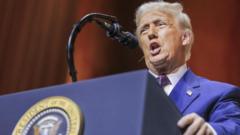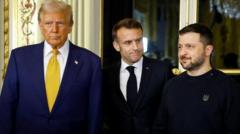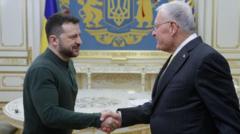The fall of the Cold War led to disillusionment with the established democratic order, contributing to a growing appetite for authoritarian leadership. Trump's recent electoral success reflects this global trend as communities grapple with the emotional fallout of a fractured world.
The Emergence of Authoritarianism: Analyzing Trump's Rise Amid Global Disillusionment

The Emergence of Authoritarianism: Analyzing Trump's Rise Amid Global Disillusionment
Historical context reveals the deep-rooted resentment fueling support for strongman politics, as seen in the recent triumph of Donald Trump.
As the Cold War came to an end nearly four decades ago, one pivotal adviser to the Soviet reformist leader, Mikhail S. Gorbachev, forewarned the West: "We are going to do the most terrible thing to you. We are going to deprive you of an enemy." The celebration over the victory of Western liberal democracy, which heralded free trade and open societies, failed to address how confusing the post-bipolar world would become.
In the aftermath, as democracy spread to newly liberated societies but often transformed into divisive forms of global capitalism, social divides widened and a shared truth eroded. In communities abandoned by technology and economic progress, despair deepened, giving rise to a craving for the assurances provided by authoritative figures. "In the absence of a shared reality, or shared facts, or a shared threat, reason had no weight beside emotion," notes Nicole Bacharan, a prominent French political scientist. The ensuing chaotic and perilous landscape fostered an overwhelming desire for strongman leadership.
Russia, once envisaged as a Western ally, reverted to being an adversary, culminating in its invasion of Ukraine in 2022. However, by this juncture, disillusionment with the ideals of Western liberalism had penetrated deeply. Russian President Vladimir V. Putin's declarations denouncing Western decadence resonated strongly with far-right nationalist movements across Europe and beyond, while a populace increasingly skeptical of democratic institutions embraced the call for authoritarianism.
Despite Western allies' robust opposition to the invasion and their commitment to upholding Ukrainian democracy, this solidarity faces growing strains. The recent and unexpected resurrection of Donald J. Trump—and his overwhelming electoral victory—emphasizes the culmination of a broad and advancing rebellion against the existing order. The warnings regarding the vulnerabilities of democracy, alongside the historical lessons linked to authoritarianism, were not sufficient to stem the tide of this strongman appeal.




















